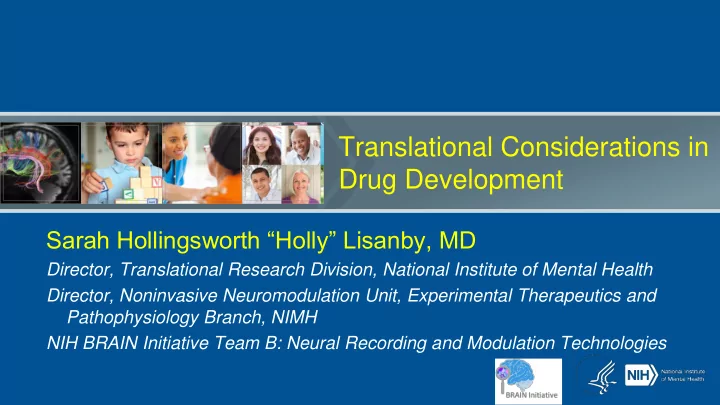

Translational Considerations in Drug Development Sarah Hollingsworth “Holly” Lisanby, MD Director, Translational Research Division, National Institute of Mental Health Director, Noninvasive Neuromodulation Unit, Experimental Therapeutics and Pathophysiology Branch, NIMH NIH BRAIN Initiative Team B: Neural Recording and Modulation Technologies
Disclosures • The views expressed are my own and do not necessarily reflect the views of the NIH, DHHS, or the US Federal Government • Patent on TMS technology, not licensed, no royalties • Equipment loan from Magstim Company • Past (>4 yrs ago) grant support from St Jude/Abbott, Neuronetics, Neosync, Cyberonics, Brainsway
Challenges in Drug Development • Heterogeneity – Within diagnoses – Comorbidities across diagnoses • Need ways to select and stratify patients going into trials
Vision for Precision Psychiatry Integrated data Data-driven clusters Genetic risk, physiology, behavior Source: Zhi-De Deng, modified from Insel and Cuthbert. Science. 2015; 348: 499
Vision for Precision Psychiatry Research Domain Criteria (RDoC) Key Deliverables • Biotypes to characterize Trans-Diagnostic Research heterogeneity & stratify Framework samples • Mechanisms across units of analysis • Putative therapeutic targets • Quantify target engagement Example: • Targeting Anhedonia Objectively quantifiable domains of transdiagnostically via function , studied across levels of analysis FAST-FAIL from genes to behaviors
FAST-FAIL Approach Develop biomarker reflecting activity of drug at the neurobiological target Use biomarker to select dose that engages target Phase IIa proof of mechanism study with change in brain activity as primary outcome Does engaging the target achieve predicted effect on brain activity? YES NO Proceed to study with Fail the drug (in an clinical endpoint informative way)
FAST-FAIL Approach Biomarker: Kappa opioid receptor – PET ligand Develop biomarker reflecting activity of drug at the neurobiological target Use biomarker to select dose that engages target Selected dose with robust KOR antagonism • Transdiagnostic sample (mood or Phase IIa POM study: inc ventral striatum activation Phase IIa proof of mechanism study with change in anxiety disorder) and Snaith score≥20) during reward anticipation primary outcome brain activity as primary outcome Does engaging the target achieve predicted effect on brain activity? YES NO Proceed to study with Fail the drug (in an Nature Reviews: Drug clinical endpoint informative way) Discovery 2019; 18:82
FAST-FAIL Results Biomarker: Kappa opioid receptor – PET ligand Develop biomarker reflecting activity of drug at the neurobiological target • Met go-criterion on primary outcome: Use biomarker to select dose that engages target Selected dose with robust KOR antagonism inc fMRI ventral striatum activation during reward anticipation Phase IIa POM study: inc ventral striatum activation during reward anticipation primary outcome Does engaging the target achieve predicted effect on brain activity? YES NO Proceed to study with Fail the drug (in an clinical endpoint informative way) Nature Medicine, In Press
FAST-FAIL Results Biomarker: Kappa opioid receptor – PET ligand Develop biomarker reflecting activity of drug at the neurobiological target • Met go-criterion on primary outcome: Use biomarker to select dose that engages target Selected dose with robust KOR antagonism inc fMRI ventral striatum activation during reward anticipation Phase IIa POM study: inc ventral striatum activation • Proof of mechanism – engaging target during reward anticipation primary outcome impacted brain circuitry implicated in hedonic response in expected Does engaging the target achieve predicted direction effect on brain activity? • Supports proceeding with assessment YES NO of clinical impact of target engagement Proceed to study with Fail the drug (in an clinical endpoint informative way) Nature Medicine, In Press
NIMH Clinical Trials Pipeline Exploratory First in Confirmatory Effectiveness experimental Human Efficacy therapeutics Pilot effectiveness of treatment, First in human & early stage prevention, & services clinical trials of novel interventions R34 drugs/devices U01 Early stage testing of Clinical trials testing effectiveness drug/device R61/33 of treatment, prevention & services interventions R01 Development of Confirmatory psychosocial & efficacy trials of non- preventative drug intervention intervention R61/33 R01
Recommend
More recommend